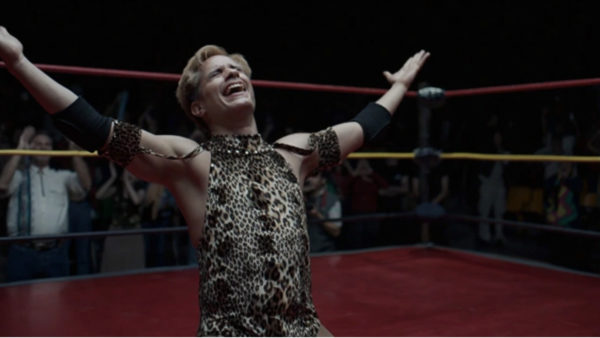
One of the buzzy queer films playing at Sundance is a biopic of trail-blazing gay lucha libre star Cassandro.
Gael García Bernal is already earning awards buzz for his portrayal of Saúl Armendáriz in director Roger Ross Williams‘ biography (Williams co-wrote the script along with David Teague). The luchador rose to fame in Mexico by challenging the stereotypical role of the “exótico” (a drag role) in the late 1980s. Exóticos are essentially the clowns of the wrestling ring: typically portrayed by men in drag, but they are rarely considered contenders in the ring. Rather, they were there for comedic relief or mockery, in large part because of the homophobia in the wrestling world (as evidenced by the repeated use of F slur in the film from both the athletes and the crowd).
Cassandro is relatively straightforward as far as biopics go. When the film opens, Saúl is performing as El Topo, a small-time player in the Juárez wrestling scene, but only because he’s never been given the chance to shine. After recruiting another queer wrestler, Sabrina (Roberta Colindrez), to become his trainer, Saúl learns how to fuse his legitimate wrestling talent with his queerness to become an expert showman and win over the homophobic crowd.
One of the more delicious aspects of the film is how Cassandro, Saúl’s new exótico persona, leans into his flamboyant nature, complete with ostentatious costumes, comedic timing and, yes, sexual innuendo in the ring. The film chronicles no less than three different matches and in each of them Cassandro starts out as the insulted underdog, but eventually wins over the audience with his combination of talent and showbiz savvy. He’s a born performer and the audience always winds up responding with glee.
Outside of the ring, Cassandro contains a number of conventional subplots. First and foremost is Saúl’s relationship with his overprotective mother, Yocasta (Perla de la Rosa). She’s a middle aged clothing lady who endures daily slut-shaming remarks around the community because she had Saúl out of wedlock. Despite the derogatory remarks, Yocasta is fiercely proud of her son; she does, however, fret about his decision to be so public about his sexuality.
Much of Saúl’s desire to become a success is also to prove a point to his estranged religious father, Eduardo (Robert Salas) – and possibly make him proud. This is in spite of the lingering sting of homophobia that Saúl experienced from his father at an early age (it has also kept them apart as adults). It’s telling that the moment, depicted in flashbacks, is tied to Saúl’s memories of watching wrestling with his father.
Finally, there is the requisite closeted relationship with another wrestler (Looking‘s Raúl Castillo) and a crush on an agent’s drug-dispensing son (Bad Bunny). Neither storyline or character is particular new or novel, but both offer additional insight into Cassandro’s character.
At the end of the day, the main reason to check out the film is Bernal, who commits to Saúl far beyond the real life man’s ostentatious costuming, which includes bleached blonde hair and sequinned, spandex body suits. The narrative predictably builds to a big match, but the outcome, and even the requisite face-to-face meeting with Saul’s estranged father, feels more restrained and less histrionic than traditional sports movies. The closest the film gets to an emotional beat is a late career talk show appearance that confirms Saúl’s pronounced sexuality in the public eye has been worth it for subsequent generations of queer Mexicans.
Cassandro employs a quieter, more graceful approach in depicting Saúl’s journey to fame and acceptance, which is both welcome and a little ironic considering the film’s flamboyant protagonist. Overall the film is a charming, albeit slightly formulaic, biopic with one hell of a great lead performance. 3.5/5
Cassandro does not currently have a release date
